
IEEE R8 Climate Challenge: AI in Enhanced Weather Forecasting
IEEE IHTC 2024
As a result of climate change, extreme weather events are becoming increasingly frequent and resulting in a growing need for more accurate real-time updated weather prediction where short term weather forecasting (nowcasting) is gaining critical importance. With availability of real-time open-source data such as Numerical Weather Prediction (NWP) forecasts, satellite and weather radar imagery, and localized weather measurements, new and interdisciplinary possibilities are emerging in the way weather forecasts are generated. Multi-modal real-time data can now be paired with machine learning approaches to improve the accuracy and reliability of weather predictions. Similar approaches are already being recognized with example initiatives by world’s leading companies and associations in the domain of meteorology and artificial intelligence.
This session brings together information and communication technologies experts from the artificial intelligence domain and meteorological experts with the aim to merge data-based and physics-based approaches for enhancing short-term weather forecasts. Second part of the session will be devoted to finals of a IEEE Region 8 (Europe, Middle East and Africa) hackathon-style competition on “AI in Enhanced Weather Forecasting” (available at IEEE DataPort) that leverages multi-source and multi-modal weather data and combined them with statistic and machine learning algorithms to generate accurate and reliable short-term weather forecasts for three case studies selected as three biomes of IEEE Region 8: Savanna Preservation, Clean Urban Air and Resilient Fields. The session envisions exchanging approaches and algorithms, and pinpointing guidelines towards worldwide coverage of improving the accuracy of weather forecasting.
9:30 – 9:50 – Vinko Lesic, IEEE Region 8 Vice Chair of Member Activities and Mariela Machado Fantacchiotti (virtual), Senior Director at IEEE Humanitarian Technologies Board
IEEE Region 8 Climate Challenges
09:50 – 10:20 – Sneha Satish Hegde, École Centrale Lyon, France
Post-COP29 Reflections: Leveraging Technology in the Climate and Energy Transition
10:20 – 10:30 – Sifa Kinoti (virtual), Octavia Carbon, Nairobi, Kenya
Data Challenges and Solutions in Enhanced Weather Forecasting
Coffee break
11:00 – 11:20 – Hrvoje Novak, University of Zagreb Faculty of Electrical Engineering and Computing, Croatia
AI-enhanced Short-term Weather Forecasts for Decision-making
11:20 – 11:30 – Hoda El-Safty (virtual), Cairo University, Egypt
A Novel Machine Learning Framework for Wave Height Forecast: Jamaica Bay, New York
11:30 – 12:00 – Ali Hessami (virtual), Chair & Technical Editor of IEEE 7000 Standard, Vice Chair and Process Architect at IEEE Ethics Certification Program for Autonomous and Intelligent Systems, Director of R&D and Innovation at Vega Systems
Ethical & Societal Implications of AI in Climate
12:00 – 12:20 – Samer Murrar (virtual), Faculty of Information Technology, Applied Science Private University in Amman, Jordan
Challenge 1st place – Visionaries Team: “Support Vector Regression in Weather Forecasting: Insights from Three Environmental Case Studies”
12:20 – 12:40 – Michael Nawar (virtual), Cairo University, Egypt
Challenge 2nd place – Team CUFE: “Forecasting Location-Specific Weather Parameters: Leveraging Insights from Large-Scale Models using Simple Approaches”

Mariela Machado Fantacchiotti & Vinko Lesic
Mariela Machado Fantacchiotti – Senior Director at IEEE Humanitarian Technologies Board
Vinko Lesic – IEEE Region 8 Vice Chair of Member Activities
TALK TITLE: IEEE Region 8 Climate Challenges
The IEEE Region 8 Climate Challenges is a program of Region-wide competitions aiming at climate change mitigation by technological initiatives. As a series of large-scale international competitions from different technical areas, challenges are focused to specific objectives, member focus groups and geographic areas to address the local perspectives. The “AI in Enhanced Weather Forecasting” challenge gathers experts in the domains, exchange approaches and algorithms, and pinpoint guidelines towards worldwide coverage of improving the accuracy of weather forecasting. For this, we have created a competition shaped as an international hackathon for teams combining machine learning and meteorology experts. The winning teams will present their solutions of the used data and algorithms. The session brings also speakers and experts from academia and industry, in the areas of artificial intelligence, meteorology and technology in climate in general. Together with other conference speakers and participants, the session will also set foundations for future stages of the competition, scaling it up and opening it to the world.
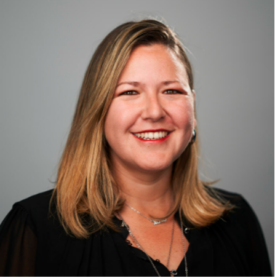 Mariela Machado is a skilled professional with nearly two decades of experience building, deploying, and scaling international humanitarian programs at the intersection of technology, social/environmental impact and public policy in the private sector, public sector and academia. As the Senior Director of Humanitarian Technology at the Institute of Electrical and Electronics Engineers (IEEE), Mariela leads multiple programs at the intersection of social/environmental impact and technology for this engineering society worldwide. Prior to IEEE, she was the Director of Programs at Newlab, a social innovation hub focused on scaling transformative technologies through public-private partnerships; she was also the Senior Program Manager at the American Society of Mechanical Engineer (ASME) & Engineering for Change working to support technology for sustainable development across all continents. Mariela advises capstone projects at the intersection of digital technology and policy at the School of International and Public Affairs (SIPA) at Columbia University and teaches a class on emerging digital technology for social and environmental impact. She is a Telecommunication Engineer with MSc in Information and Communication Technologies and a MPA in Sustainable Development from Columbia University. Mariela is fluent in 5 languages: Spanish, English, French, Swedish and Italian.
Mariela Machado is a skilled professional with nearly two decades of experience building, deploying, and scaling international humanitarian programs at the intersection of technology, social/environmental impact and public policy in the private sector, public sector and academia. As the Senior Director of Humanitarian Technology at the Institute of Electrical and Electronics Engineers (IEEE), Mariela leads multiple programs at the intersection of social/environmental impact and technology for this engineering society worldwide. Prior to IEEE, she was the Director of Programs at Newlab, a social innovation hub focused on scaling transformative technologies through public-private partnerships; she was also the Senior Program Manager at the American Society of Mechanical Engineer (ASME) & Engineering for Change working to support technology for sustainable development across all continents. Mariela advises capstone projects at the intersection of digital technology and policy at the School of International and Public Affairs (SIPA) at Columbia University and teaches a class on emerging digital technology for social and environmental impact. She is a Telecommunication Engineer with MSc in Information and Communication Technologies and a MPA in Sustainable Development from Columbia University. Mariela is fluent in 5 languages: Spanish, English, French, Swedish and Italian.
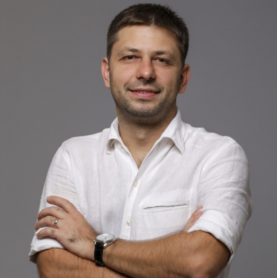 Vinko Lesic received his PhD degree in 2014 from University of Zagreb Faculty of Electrical Engineering and Computing, Zagreb, Croatia (UNIZG-FER). Today, he is an Associate Professor within the Laboratory for Renewable Energy Systems (LARES – https://www.lares.fer.hr) at the Department of Control and Computer Engineering of UNIZG-FER. His focus is on control algorithms, optimisation and artificial intelligence in renewable energy and sustainability topics or more particularly convex optimisation and machine learning methods for buildings and transport energy efficiency, microgrid operation, and agriculture. His patented PhD research he shaped into the technology transfer project with a multinational aerospace R&D company. Since then, he has been leading 8 scientific-research and development and 4 technology transfer projects, and an own research group of 25 scientists. He shares his scientific commercialisation experience through mentoring in local and international programmes for technology innovations. He co-authored over 80 journal and conference papers and 5 patents. He is an active volunteer in IEEE association, currently serving the role of Vice Chair of IEEE Region 8 Member Activities, coordinating programs on knowledge transfer and international networking of over 80,000 scientists and engineers from Europe, Africa and Middle East. He co-founded a program of IEEE Region 8 Entrepreneurship Initiative, aimed at design thinking, startups formation and acceleration, which examined over 800 technical innovations from 40 countries.
Vinko Lesic received his PhD degree in 2014 from University of Zagreb Faculty of Electrical Engineering and Computing, Zagreb, Croatia (UNIZG-FER). Today, he is an Associate Professor within the Laboratory for Renewable Energy Systems (LARES – https://www.lares.fer.hr) at the Department of Control and Computer Engineering of UNIZG-FER. His focus is on control algorithms, optimisation and artificial intelligence in renewable energy and sustainability topics or more particularly convex optimisation and machine learning methods for buildings and transport energy efficiency, microgrid operation, and agriculture. His patented PhD research he shaped into the technology transfer project with a multinational aerospace R&D company. Since then, he has been leading 8 scientific-research and development and 4 technology transfer projects, and an own research group of 25 scientists. He shares his scientific commercialisation experience through mentoring in local and international programmes for technology innovations. He co-authored over 80 journal and conference papers and 5 patents. He is an active volunteer in IEEE association, currently serving the role of Vice Chair of IEEE Region 8 Member Activities, coordinating programs on knowledge transfer and international networking of over 80,000 scientists and engineers from Europe, Africa and Middle East. He co-founded a program of IEEE Region 8 Entrepreneurship Initiative, aimed at design thinking, startups formation and acceleration, which examined over 800 technical innovations from 40 countries.
Sneha Satish Hegde
Postdoc at École Centrale Lyon, France
TALK TITLE: Post-COP29 Reflections: Leveraging Technology in the Climate and Energy Transition
Explore the critical role of technology in advancing climate and energy goals following the discussions and commitments made at COP29. As global priorities shift towards sustainable energy solutions, we’ll examine how emerging technologies can accelerate the transition to cleaner, more resilient energy systems. Key focus areas include digital innovation, renewable energy integration, and strategies to enhance infrastructure resilience.
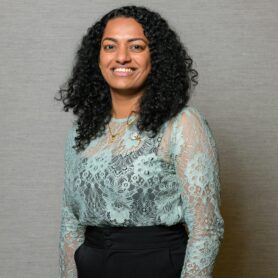 Dr. Sneha Satish Hegde is a scientific researcher and is based in France. She recently completed her postdoctoral research at École Centrale Lyon and earned her doctoral degree in Electronics from the University of Montpellier, France. Her research aligns with the Territorial Just Transition Plan and the Energy-Climate Plan in two key ways: first, by investigating the aging of components in future HVDC and MVDC energy networks, which are critical for renewable energy integration; and second, by studying eco-friendly insulation materials to reduce system size, enhance defect detection, and lower the carbon footprint in component manufacturing. This research provides valuable insights for developing sustainable, compact, and environmentally responsible energy network components. During her academic journey, Dr. Hegde actively participated in volunteering activities and worked with various non-profit organizations in India. Since 2019, she has been a member of IEEE and DEIS, currently serving as the Vice-Chair for DEIS Young Professionals (YP) and Chair of DEIS Women in Engineering (WIE). In January 2023, she joined the Computer Society (CS) and now leads the Region 8 (Europe, Africa, Middle East) Climate and Sustainability Portfolio. Additionally, she leads the Communications team for CS SYP and leads the Partnerships for the IEEE Young Professionals Climate and Sustainability Task Force (CSTF).
Dr. Sneha Satish Hegde is a scientific researcher and is based in France. She recently completed her postdoctoral research at École Centrale Lyon and earned her doctoral degree in Electronics from the University of Montpellier, France. Her research aligns with the Territorial Just Transition Plan and the Energy-Climate Plan in two key ways: first, by investigating the aging of components in future HVDC and MVDC energy networks, which are critical for renewable energy integration; and second, by studying eco-friendly insulation materials to reduce system size, enhance defect detection, and lower the carbon footprint in component manufacturing. This research provides valuable insights for developing sustainable, compact, and environmentally responsible energy network components. During her academic journey, Dr. Hegde actively participated in volunteering activities and worked with various non-profit organizations in India. Since 2019, she has been a member of IEEE and DEIS, currently serving as the Vice-Chair for DEIS Young Professionals (YP) and Chair of DEIS Women in Engineering (WIE). In January 2023, she joined the Computer Society (CS) and now leads the Region 8 (Europe, Africa, Middle East) Climate and Sustainability Portfolio. Additionally, she leads the Communications team for CS SYP and leads the Partnerships for the IEEE Young Professionals Climate and Sustainability Task Force (CSTF).
Sifa Kinoti
Leader of Monitoring, Reporting and Verification efforts at Octavia Carbon, Nairobi, Kenya
TALK TITLE: Data Challenges and Solutions in Enhanced Weather Forecasting
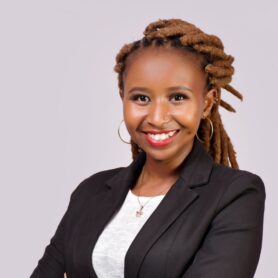 Sifa Kinoti is an environmental and data science professional with a strong background in using technology to solve environmental challenges. She holds a Bachelor of Science in Environmental and Biosystems Engineering from the University of Nairobi, where she led impactful initiatives such as serving as Chairlady of the IEEE Women in Engineering Student Branch, recognized among the top 10% Affinity Groups globally in the year 2023/2024. Sifa is passionate about sustainable development, as evidenced in her work in designing climate technologies and policy advocacy. Some of her notable projects include developing a machine learning model to predict air quality in Nairobi and design of a green hydrogen project. These projects have been presented at international conferences and competitions such as IEEE YESIST12, Global Students AI Summit and COP28. Her expertise also spans in providing water, energy and green building solutions. Sifa also volunteers as the Assistant Partnerships Lead in the IEEE Young Professionals Climate and Sustainability Subcommittee, where she works to create relationships with external stakeholders to promote representation of young professionals in high level science-policy engagements and sustainability workshops. Currently, she leads the monitoring, reporting and verification efforts at Octavia Carbon, the first Direct Air Capture facility in the Global South.
Sifa Kinoti is an environmental and data science professional with a strong background in using technology to solve environmental challenges. She holds a Bachelor of Science in Environmental and Biosystems Engineering from the University of Nairobi, where she led impactful initiatives such as serving as Chairlady of the IEEE Women in Engineering Student Branch, recognized among the top 10% Affinity Groups globally in the year 2023/2024. Sifa is passionate about sustainable development, as evidenced in her work in designing climate technologies and policy advocacy. Some of her notable projects include developing a machine learning model to predict air quality in Nairobi and design of a green hydrogen project. These projects have been presented at international conferences and competitions such as IEEE YESIST12, Global Students AI Summit and COP28. Her expertise also spans in providing water, energy and green building solutions. Sifa also volunteers as the Assistant Partnerships Lead in the IEEE Young Professionals Climate and Sustainability Subcommittee, where she works to create relationships with external stakeholders to promote representation of young professionals in high level science-policy engagements and sustainability workshops. Currently, she leads the monitoring, reporting and verification efforts at Octavia Carbon, the first Direct Air Capture facility in the Global South.
Hrvoje Novak
Postdoc at University of Zagreb Faculty of Electrical Engineering and Computing, Croatia
TALK TITLE: AI-enhanced Short-term Weather Forecasts for Decision-making
As global warming intensifies, learning how to adapt to climate changes and consequent extreme weather events is gaining urgency. More accurate weather models and intelligent warning systems enable the improvement of the resilience of the local areas and production activities. One way of achieving this is through obtaining more accurate short term weather forecasts tailored for specific applications by analyzing large amounts of publicly available data such as localized meteorological measurements obtained from IoT sensors, open-source forecasts and even Earth observation data. In this talk we will show how we apply machine learning algorithms to efficiently improve and transform weather forecasts obtained from meteorological services and implement them in various decision-making use-cases such as precision agriculture, heating and cooling in buildings, urban infrastructure optimization (water distribution, urban lighting, traffic), logistics optimization and many more.
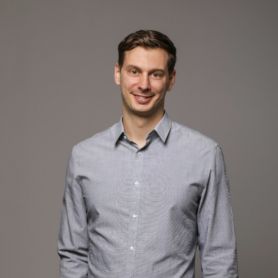 Hrvoje Novak (Member, IEEE) received the Ph.D. degree from the University of Zagreb Faculty of Electrical Engineering and Computing, Zagreb, Croatia, in 2019. Currently, he is a Lead Researcher with the Department of Control and Computer Engineering and a member of the Laboratory for Renewable Energy Systems. He has coauthored several scientific and professional articles in the field of smart transport, buildings, water distribution, and agriculture. His current research interests include the domain of predictive control and machine learning algorithms with applications in technical systems.
Hrvoje Novak (Member, IEEE) received the Ph.D. degree from the University of Zagreb Faculty of Electrical Engineering and Computing, Zagreb, Croatia, in 2019. Currently, he is a Lead Researcher with the Department of Control and Computer Engineering and a member of the Laboratory for Renewable Energy Systems. He has coauthored several scientific and professional articles in the field of smart transport, buildings, water distribution, and agriculture. His current research interests include the domain of predictive control and machine learning algorithms with applications in technical systems.
Hoda El-Safty
Assistant Professor at Irrigation and Hydraulics Department, Civil Engineering, Cairo University, Egypt
TALK TITLE: A Novel Machine Learning Framework for Wave Height Forecast: Jamaica Bay, New York
This study aims to develop an innovative machine learning framework for forecasting wave height using meteorological forcings such as wind and pressure. To achieve this, a high-resolution coupled hydrodynamic-wave model, driven by wind and pressure fields from a local weather station and the ERA5 reanalysis dataset, is employed to produce a 40-year (1980–2019) hindcast of wave heights within Jamaica Bay, New York. The model’s accuracy is evaluated using existing wave height field measurements, with biases identified and corrected. The resulting corrected model outputs are used to train a combination of XGBoost and CatBoost models, leveraging the growing popularity of boosting algorithms for their exceptional forecasting accuracy. The machine learning framework is trained and tested using local meteorological forcings. Time-series comparisons are conducted between the coupled hydrodynamic model outputs, machine learning predictions, and observed significant wave heights (Hs) at two locations within the bay. Future work involves incorporating alternative weather forcings, such as GFS and ECMWF data, into the machine learning framework to compare the predicted wave heights against global wave height forecasts.
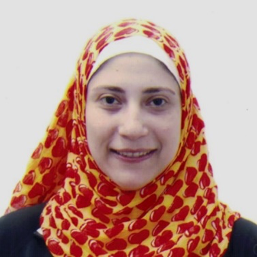 Hoda El-Safty is an assistant professor in the Irrigation and Hydraulics department of Civil Engineering at Cairo University. She received both bachelor’s and master’s degrees in civil engineering computer engineering from Cairo University and a PhD degree in coastal engineering from University of Southern California in August 2017. Her research interests include computational hydrodynamic modeling, flood hazard, storm surge, coastal processes, machine learning, remote sensing, heat/cold wave hazard, design and analysis of coastal structures, computational fluid dynamics models, Tsunami modeling, sediment transport and shoreline restoration as well as parallel computing.
Hoda El-Safty is an assistant professor in the Irrigation and Hydraulics department of Civil Engineering at Cairo University. She received both bachelor’s and master’s degrees in civil engineering computer engineering from Cairo University and a PhD degree in coastal engineering from University of Southern California in August 2017. Her research interests include computational hydrodynamic modeling, flood hazard, storm surge, coastal processes, machine learning, remote sensing, heat/cold wave hazard, design and analysis of coastal structures, computational fluid dynamics models, Tsunami modeling, sediment transport and shoreline restoration as well as parallel computing.
Ali Hessami
Chair & Technical Editor of IEEE 7000 Standard
Vice Chair and Process Architect at IEEE Ethics Certification Program for Autonomous and Intelligent Systems
Director of R&D and Innovation at Vega Systems
TALK TITLE: Ethical & Societal Implications of AI in Climate
This talk will cover the advances on technology ethics and two IEEE initiatives namely IEEE 70xx suite of standards and the Ethics Certification Programme for Autonomous and Intelligent Systems (ECPAIS). The ECPAIS suites of SMART technology ethics criteria comprise Accountability, Transparency, Algorithmic Bias, Privacy, Fairness and Responsible Governance. These provide a basis for raising awareness and offer a comprehensive systematic framework for the innovators, researchers and technologists as well as small and large, public and private enterprises involved in AI and autonomous technology innovation, development and deployment. The talk also explores the use of AI in climate science and ethical assurance of these applications.
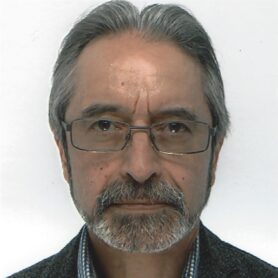 Ali is currently the Director of R&D and Innovation at Vega Systems with extensive track record in systems assurance and safety, security, sustainability, knowledge assessment/management methodologies and has a background in design and development of advanced control systems for business and safety critical industrial applications. Ali is a UK expert on CENELEC & IEC safety/security systems, hardware & software standards committees. He was appointed by CENELEC as convener of a number of Working Groups for review of Safety Critical Software Standards. Ali also a member of Cyber Security Standardisation at CENELEC WG26 Group and IEC PT63452. A past Section chair in the UK and Ireland section of IEEE and chaired the Humanitarian Technologies (SIGHT) group, SMC and Systems Council Chapters in the section. During 2017 Ali joined the IEEE Standards Association (IEEE-SA) initially as a committee member for the new landmark IEEE 7000 standard focused on “Addressing Ethical Concerns in System Design”. He was subsequently appointed as the Technical Editor and later the Chair of IEEE 7000 standard to its publication in 2021. In November 2018, he was appointed as the Vice Chair and Process Architect of the IEEE ‘s global Ethics Certification Programme for Autonomous & Intelligent Systems (ECPAIS). This is now a global programme under IEEE CertifAIEd brand for criteria development, evaluation, conformity assessment and certification of products, systems and services hinged around AI technologies. Ali is a Visiting Professor at London City University’s Centre for Systems and Control in the School of Engineering & Mathematics and at Beijing Jiaotong University School of Electronics & Information Engineering. He is also a Fellow of Royal Society of Arts (FRSA), Fellow of the UK Institution of Engineering & Technology (IET) and a Life Senior Member of IEEE.
Ali is currently the Director of R&D and Innovation at Vega Systems with extensive track record in systems assurance and safety, security, sustainability, knowledge assessment/management methodologies and has a background in design and development of advanced control systems for business and safety critical industrial applications. Ali is a UK expert on CENELEC & IEC safety/security systems, hardware & software standards committees. He was appointed by CENELEC as convener of a number of Working Groups for review of Safety Critical Software Standards. Ali also a member of Cyber Security Standardisation at CENELEC WG26 Group and IEC PT63452. A past Section chair in the UK and Ireland section of IEEE and chaired the Humanitarian Technologies (SIGHT) group, SMC and Systems Council Chapters in the section. During 2017 Ali joined the IEEE Standards Association (IEEE-SA) initially as a committee member for the new landmark IEEE 7000 standard focused on “Addressing Ethical Concerns in System Design”. He was subsequently appointed as the Technical Editor and later the Chair of IEEE 7000 standard to its publication in 2021. In November 2018, he was appointed as the Vice Chair and Process Architect of the IEEE ‘s global Ethics Certification Programme for Autonomous & Intelligent Systems (ECPAIS). This is now a global programme under IEEE CertifAIEd brand for criteria development, evaluation, conformity assessment and certification of products, systems and services hinged around AI technologies. Ali is a Visiting Professor at London City University’s Centre for Systems and Control in the School of Engineering & Mathematics and at Beijing Jiaotong University School of Electronics & Information Engineering. He is also a Fellow of Royal Society of Arts (FRSA), Fellow of the UK Institution of Engineering & Technology (IET) and a Life Senior Member of IEEE.
Samer Murrar
Faculty of Information Technology, Applied Science Private University in Amman,
Project Manager at Omicron Solution
TALK TITLE: Challenge 1st place – Visionaries Team: Support Vector Regression in Weather Forecasting: Insights from Three Environmental Case Studies
Accurate weather forecasting is vital to addressing the growing challenges of climate change and extreme weather. This talk explores the application of support vector regression (SVR) in forecasting key weather variables across diverse environmental contexts: savanna conservation, clean urban air, and resilient fields. Using real-world data from Open-Meteo, the study demonstrates how feature selection, preprocessing, and hyperparameter tuning enable accurate forecasts. The results highlight the strengths and limitations of SVR, with implications for improving forecast accuracy and scalability.
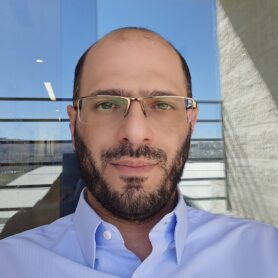 Samer Murrar is an IT Project Manager at Omicron Solution with 20 years of experience in software development and business automation. He holds a Master of Computer Science from Applied Science Private University, with research interests in Machine Learning and Natural Language Processing (NLP). LinkedIn profile: https://www.linkedin.com/in/samermurrar/
Samer Murrar is an IT Project Manager at Omicron Solution with 20 years of experience in software development and business automation. He holds a Master of Computer Science from Applied Science Private University, with research interests in Machine Learning and Natural Language Processing (NLP). LinkedIn profile: https://www.linkedin.com/in/samermurrar/
Michael Nawar
Assistant Professor at Cairo University, Egypt
TALK TITLE: Challenge 2nd place – Team CUFE: Forecasting Location-Specific Weather Parameters: Leveraging Insights from Large-Scale Models using Simple Approaches
Accurate forecasts of location-specific weather parameters, such as temperature, humidity, precipitation, solar radiation, and air quality index, are essential for various industries, including agriculture, energy, and urban planning. While large-scale weather models provide valuable global and regional forecasts, they often lack the resolution required for precise, site-specific estimates of auxiliary variables like solar radiation and air quality. This talk investigates how insights from large-scale weather models can be used to predict weather parameters at specific locations, using simple yet effective statistical and machine-learning techniques. The proposed approach enhances forecast accuracy and reliability for weather variables that are otherwise challenging to estimate at fine spatial scales.
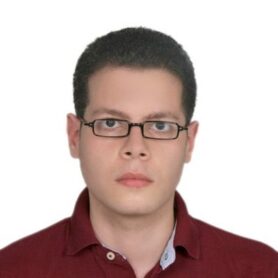 Michael Ibrahim is an assistant professor in the department of Computer Engineering at Cairo University. He received both bachelor’s and master’s degrees in computer engineering from Cairo University and a PhD degree in industrial engineering with a minor in statistics from Georgia Institute of Technology in December 2019. His research interests include scheduling theory, optimal control, forecasting, machine learning, and deep learning. As a machine learning enthusiast, he has participated in multiple online competitions, earning several awards for his achievements.
Michael Ibrahim is an assistant professor in the department of Computer Engineering at Cairo University. He received both bachelor’s and master’s degrees in computer engineering from Cairo University and a PhD degree in industrial engineering with a minor in statistics from Georgia Institute of Technology in December 2019. His research interests include scheduling theory, optimal control, forecasting, machine learning, and deep learning. As a machine learning enthusiast, he has participated in multiple online competitions, earning several awards for his achievements.
MODERATOR – Neemat Abdelrahim
Member of IEEE Region 8 Humanitarian Technology Activities
Business Analyst at Royal Cyber Inc., Kingdom of Saudi Arabia
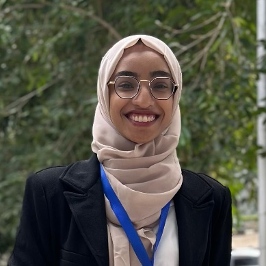 Neemat Abdelrahim is a highly skilled business analyst with a specialization in UX/UI design, currently employed at Royal Cyber Inc. in the Kingdom of Saudi Arabia. Her professional acumen spans a wide range of competencies, including business requirements analysis and elicitation, usability testing, user story creation, and prototyping, among other essential skills in the field.
Neemat Abdelrahim is a highly skilled business analyst with a specialization in UX/UI design, currently employed at Royal Cyber Inc. in the Kingdom of Saudi Arabia. Her professional acumen spans a wide range of competencies, including business requirements analysis and elicitation, usability testing, user story creation, and prototyping, among other essential skills in the field.
Since 2023, Neemat has been a corresponding member of the IEEE Region 8 Humanitarian Activities Committee (HTAC), actively contributing to the advancement of humanitarian efforts within the IEEE community. Her leadership capabilities are further evidenced by her role as the Chairperson of the IEEE Sudan University of Science and Technology Student Branch, where she has been instrumental in guiding and mentoring the next generation of engineers and technologists.
With nearly four years of active membership in IEEE, Neemat has accumulated extensive experience and insight into the organization’s mission and values. Her dedication to the IEEE extends beyond membership; she has also volunteered for more than three years within the IEEE Sudan Subsection, demonstrating her commitment to supporting and enriching the engineering community. In addition, Neemat has been affiliated with the International Institute of Business Analysis (IIBA) for less than a year, broadening her expertise and professional network in the field of business analysis.

